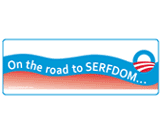Greedy capitalists… Wall Street raiders… Big bad business… The free market must be amoral – right?
 Arthur Brooks, president of the American Enterprise Institute, says not so fast. In fact, he asserts that the free market is the only economic system that actually is moral – essentially because money doesn’t buy happiness.
Arthur Brooks, president of the American Enterprise Institute, says not so fast. In fact, he asserts that the free market is the only economic system that actually is moral – essentially because money doesn’t buy happiness.
Dr. Benjamin Wiker elaborates in a To the Source article titled: The Moral Case for the Free Market ~
Studies show that people who simply inherit money, people who win the lottery, and people on welfare are not happy—whatever the amount received, it provides zero satisfaction because the receiver didn’t work for it. The money doesn’t represent something the recipient actually achieved through his or her own efforts. Like a trophies given out to everyone, or a class in which everybody gets an “A,” the money doesn’t mean anything. It wasn’t really earned. It doesn’t make them happy.

True self-esteem doesn’t come from empty words of praise. It develops from a personal sense of accomplishment.
“I did build that!”
It’s really just human nature. We don’t achieve lasting happiness, or develop a sense of self-worth from someone patting us on the head and telling us how wonderful we are for no particular reason.
… people who work at a meaningful job, doing something that really makes a difference; people who have a worthy goal to work for, whether it is build up a company by their own efforts, start a shelter for the homeless, or raise their children into happy, healthy, and morally well-formed adults—they are the happy ones. It isn’t the money—sometimes there’s no money involved. It’s the success achieved through their own hard work.
Furthermore, it’s morality that makes it wrong for the government to penalize success by taking from those who have achieved it ~
What’s truly just is not taking the wealth of the wealthy and spreading it to the poor, but rewarding real merit, real effort, real achievement. That’s what the free market attempts to do.
In this, the free market works like a well-run classroom. Students who work hard and know the material well should earn an “A.” Students who don’t work hard and don’t know the material should get a “D” or an “F.” Very few, Brooks maintains, want points earned by the “A” students to be shaved off and applied to the grades of those getting a “D” or “F.” That’s not fair. Why bother earning an “A”?
Clearly, we aren’t all equal in talent, ability or ambition, and it’s not the government’s responsibility to force unrealistic “equal” outcomes. Instead, a true free market, provides everyone with an equal opportunity to succeed.
Still, there will always be those who are disadvantaged for one reason or another. But here again, morality informs us that society should provide a safety net and/or a helping hand for the truly needy.
No one in America should be destitute. Furthermore, a good free market-based government will try to provide opportunities for the disadvantaged—not give-aways, but real opportunities—for earned success. The goal of the safety net is to keep people from falling into abysmal poverty; the goal of providing opportunities for earned success is not the same as the goal of providing unearned entitlements.
And finally, “charity begins at home.” When the federal government assumes responsibilities that belong to the family and local communities it has a corrosive effect on those institutions ~
…we need to express our real charity for the poor, the disadvantaged, the elderly—in our family, in our community, with our work, in accordance with the demands of our faith. Government can supplement these efforts, but we cannot simply shift the moral burden of providing charity onto the government. That charity is part of our work, and hence part of our happiness.
~~~~~~~~~~~~~~~~~~~~~
Greed, cronyism and the corruption on Wall Street aren’t products of the free market. They’re a reflection of mankind’s fallen nature. They’re what happens when a society rejects morality.
~~~~~~~~~~~~~~~~~~~~~
Related:
Can the free market provide opportunity for all? ~ an interview with Arthur Brooks at American Public Media Marketplace
Steve Forbes has a new book out that advances the same argument Brooks is making: Freedom Manifesto – Why Free Markets are Moral, and Big Government Isn’t ~




